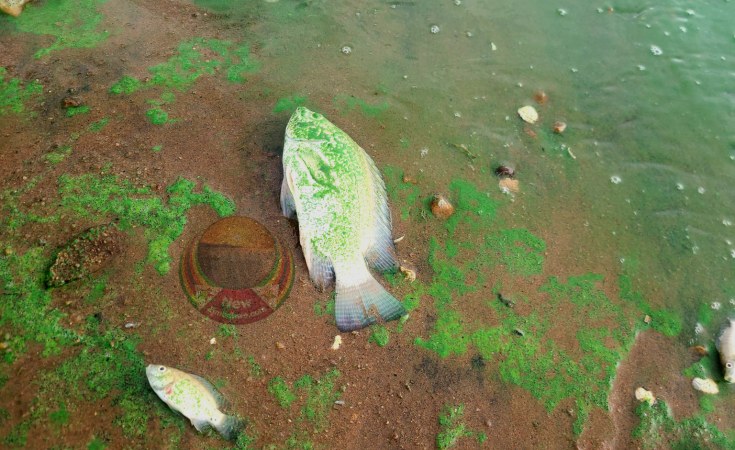The pollution levels in Lake Chivero, Harare's primary water source, have reached alarming heights, adversely affecting both aquatic and wildlife.
The rise in cyanobacteria due to pollution--primarily from raw sewage--poses significant health risks to humans and animals alike.
The toxic algae blooms have already resulted in the deaths of several animals, including four rhinos, three zebras, four wildebeests and four fish eagles.
Additionally, over 1 000 dead fish have been washed ashore, raising concerns for local fishermen and consumers.
Despite the presence of dead fish, some fishermen continue to catch and sell fish from the lake.
One fisherman remarked, "The fish in the water are okay. You can easily identify those that are affected because they are dead."
Nearby farms have also reported livestock developing problems with Mr Vareta Kupanyira, manager at Cumbrae Farm, noting that four of their cattle had developed sores after drinking water from the lake.
"When there is no electricity to pump water from the borehole, they drink from the lake," he said, highlighting the risk posed by contaminated water.
A recent study by ecologist Professor Christopher Magadza indicated a dire situation for Lake Chivero.
He warned of the lake's warming and a potential ecological shift towards a permanent cyanobacteria-dominated ecosystem, particularly under conditions of elevated temperatures and nutrient overload.
Cyanobacteria, such as Anabaena and Microcystis, thrive in warm, nutrient-rich waters, leading to explosive growth.
During blooms, toxins are released into the water, posing risks to both humans and animals.
The Zimbabwe Parks and Wildlife Management Authority (ZimParks) confirmed that the deaths of fish and animals are linked to the lake's poor water quality.
"Preliminary investigations indicate that sewage runoff from the Marimba area has forced contaminated water into multiple bays, creating hazardous conditions for aquatic life. High pollution results in a boom in algae growth, which increases oxygen demand on the water body resulting in high mortality for the fish. As wind patterns continue to shift, we anticipate that this issue may further impact fish populations across the lake," said ZimParks spokesperson Mr Tinashe Farawo.
He said a team was currently on the ground carrying out further investigations on a broader scale.
"To mitigate the risk, we implemented measures to deter the animals from drinking from the affected dam by placing salt blocks and game nuts around the park, as well as artificial water points with clean water. Regrettably, these efforts proved to be not enough, as the animals continued to drink from the lake," said Mr Farawo.
Lake Chivero is one of Zimbabwe's seven Ramsar-protected sites as a wetland of international importance and a vital water source for the country.
Besides being the main water source for Harare and nearby towns, Lake Chivero is a habitat for many animals, including white rhinos, zebras, pangolins and over 400 bird species.
Temporary corrective measures were put in place in an effort to address the challenges being experienced at the recreation park to no avail.
"The pollution challenges facing this lake require a whole-of-Government and whole-of-society approach therefore we urge the public and relevant authorities to understand the effects of pollution and to join us in advocating for better environmental practices to protect our biodiversity," Mr Farawo said.
Despite the ongoing pollution, the Harare City Council insists that the water treated and supplied to over a million residents is safe for consumption.
Mayor Jacob Mafume acknowledged the algae issue but reassured that the water is treated in accordance with World Health Organisation standards.
"Every body of water that is untreated is unsafe so we always treat our water in line with World Health Organisation standards. Every year during this period, we get fish that die as a result of lack of oxygen caused by the algae. The situation is being exacerbated by the heat but once the rains come, the situation will get better. However, what happened with the animals needs to be further investigated for us to understand what is happening," he said.
He acknowledged that the council needed to find a solution to the growth of algae to ensure that life in and around the lake is protected.
Mayor Mafume also said the long-term solution was expanding the sewer treatment plants to ensure that the sewer is treated before it reaches the lake.
"Our sewer plants have a design capacity of 80 megalitres but we have about 200 megalitres of sewer being channelled through. We need to expand our plants to accommodate this excess. We are engaged with the Taskforce and the Ministry of Local Government on how we can do this," he added.
In 2020, the Ministry of Environment launched a campaign to declare Lake Chivero and Darwendale Dams as Ecologically Sensitive areas.
This was done in terms of (113) (1) of the Environmental Management Act (EMA) [Chapter 20:17] as read with Section 7 (2) (a) of the Environmental Management (Efluent and Solid Waste Disposal) Regulations 2007 (Statutory Instrument 6 of 2007).
The situation at Lake Chivero comes as Zimbabwe is set to host the RAMSAR Convention CoP15 in July next year.
The event will prioritise issues such as the protection of freshwater sources, biodiversity and sustainable use of wetlands.
The Ramsar Convention on Wetlands is a convention that recognises the importance of wetlands for providing clean water, food, and protection from extreme weather events. Wetlands also play a role in mitigating global heating by capturing and storing atmospheric carbon dioxide.


